Think of this as Volume 17, Number 40 of the newsletter I have written weekly since March, 1997. Enjoy.
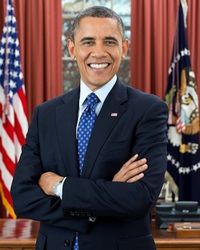 Every crisis in America's history has
Every crisis in America's history has
been a unique mixture of causes requiring a unique cure.
The Civil War was existential, the war
itself inevitable. The progressive crisis was governmental. The New
Deal problem was economic. The Vietnam crisis was social.
Our present crisis is political. What
looked at first like an economic problem turned out to be a political
one. This crisis tests whether our political institutions can survive
an all-out attack from a determined minority, or whether a system
originally designed to protect slavery would also, by its nature,
halt the march of progress.
We have the perfect President for this
crisis. Barack Obama studied constitutional law. He understands the
nature of our political system inside and out. He understands our
past and where we need to go.
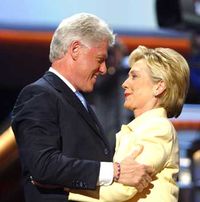 I don't think Hillary Clinton could
I don't think Hillary Clinton could
have been a good crisis President. Her husband was an anti-thesis
President, that is, he accepted the theses of the Nixon era and
leaned against them, moderated them, said yes-but to them. The
crafting of a new kind of politics comes out of an old anti-thesis –
Lincoln followed Clay and Nixon followed Eisenhower – but what
emerges is materially different. (This doesn't mean she'd make a bad president after a new thesis is validated — she will. But she's transactional by nature, not transformative.)
Even five years into the Age of Obama
we don't yet know what will emerge from this crisis. It is still in
the balance. The wealthy few and the muddled many driving this crisis
– an interesting combination of the political forces who drove the
progressive and New Deal crises – understand the basic weakness of
the American system, and are pushing it to the wall.
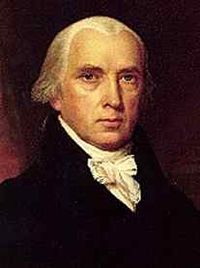
for the power of a political minority. In a parliamentary system of
government, minorities may be guaranteed rights under law, but
politically the majority rules. Whether that majority is an absolute
one – as in a first-past-the-post system – or cobbled together as
in proportional representation, the result is always the same.
Majority rules.
In the American system, majorities
don't always have to rule. There are checks and balances in place to
guard against short-term majorities taking decisive action. American
courts are powerful, and our legislative system was designed to
frustrate rapid change.
There's a reason why America's system
is unique. It was designed to protect the “rights” of
slave-owners, and to create an artificial balance once the majority
understood the hypocrisy of it. That's what made the Civil War so
existential. But the result was only a collection of amendments to
the document – the basic structure remained intact. The popular
will remains easy to thwart.
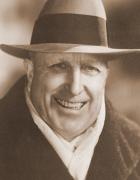
Randolph Hearst, who backed the film “Gabriel Over the White House”
during the crisis year of 1932. The only way Hearst, a progressive,
could see to get the New Deal through was under martial law. It
turned out that an overwhelming majority, led by Franklin D.
Roosevelt, could accomplish many of the same aims without it. This is
what I call the Roosevelt Thesis of Unity, which held until the
election of Richard Nixon, whose Thesis of Conflict held until 2008.
Hearst's call for martial law was very
much part of the era's zeitgeist, and fighting against this contempt
for democracy became the underlying theme of the Roosevelt era.
Hearst's politics were centrist, but the 1930s featured many outright
Nazi sympathizers on the right wing of the American political
spectrum, and outright communists on the left wing. Democracy itself
was on trial.
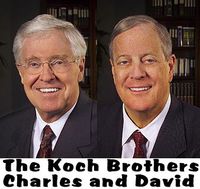
we're going through. A group you might call Hearst-ists, led by David
and Charles Koch, believe that the system should be based entirely on
the needs and demands of a wealthy elite, and they have worked for
decades to make the system conform to their needs, to make it as
feudal as America was before the Revolution. The brothers were
successful, especially through the Bush years, but the needs of our
time run counter to their needs, which is why for the Koch brothers
this is such an existential crisis. It's why they have pushed it to
the wall.
Wealth has dominated American politics
since the Civil War, but for 150 years the needs of wealth and the
needs of the country could conform with one another. By the Koch
logic that's true today. The problem as they see it is an artificial
shortage of energy, and fracking provides that energy. But fracking
only provides a limited amount of energy. The real solution to our
energy problem lies in technology, in turning away from burning stuff
like cavemen and harnessing the abundance around us. The Sun shines,
the wind blows, the tides roll, the crops grow, and we live on a
molten rock.

Kochs. It results in lower energy costs, and loosens the stranglehold
they have over wealth. So it's true that underneath the political
struggle there lies an economic struggle, but the economic abundance
can't be truly unleashed until the political war is won.
Ever since he entered national
politics, Barack Obama has been gearing up for this war, and at the
heart of that is what we know now as cloud technology. He organized
his campaign around cloud from the very first, and the technology
trends since have shown the wisdom of this. While fracking offers
high-cost abundance, cloud offers low-cost abundance.
But while clouds can build support,
they have a harder time building passion. After a while the emergency
e-mails coming from a cloud-based system turn into semi-spam. They
get ignored by the people you most need to take action. Because
they're always demanding the same sort of action – send an e-mail,
send money, sign a petition. The cloud hasn't called on Americans
supporting the President toward any deeper commitment than that.
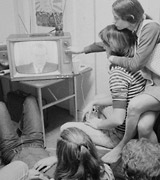
were built on action, and a committed minority can engage in very
strong action. A generation ago, that meant marches, demonstrations,
sit-ins. Today it means truckers driving around the city and clogging
traffic, or veterans tearing down fences to get at beloved memorials.
The atmospherics of action trump what the cloud can offer. The noisy
minority can trump the silent majority.
There is no doubt that the President
has a majority behind him. What he lacks is a clear way to
demonstrate that power which overwhelms what the Koch brothers can do
through direct action and bending the power our Constitution gives
minorities for frustrating change.
That's the political nature of the
crisis. As of this writing, the President had not yet solved it. He
seems to believe that consistent pressure will force the House to
bend to his will, and that once that will is bent the system will
have been changed. But there remain the courts, and there remain the
states, and the battle won't truly be won until those fights are won,
on behalf of the new majority.
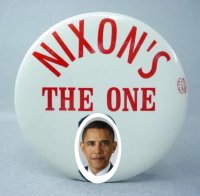
just like real ones are. They're just not as obvious, and they take
longer to resolve, since people aren't dying in waves. But political
war is what we've had since November of 2008, and political war is
what we'll have until the new majority is respected. Which is why
this is a time that tries the liberal soul. After a lifetime as a
minority, it's hard to act as a majority, to do it consistently, to
show up whenever the electoral bell is wrung, and to convince the
minority that their days in power are over.
Yet that's what these times demand.
That's the revolution this President is leading. Political victory
will secure economic victory, and economic victory will secure the
future. But political victory has yet to be won.


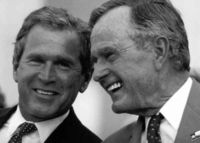








fewr
fewr